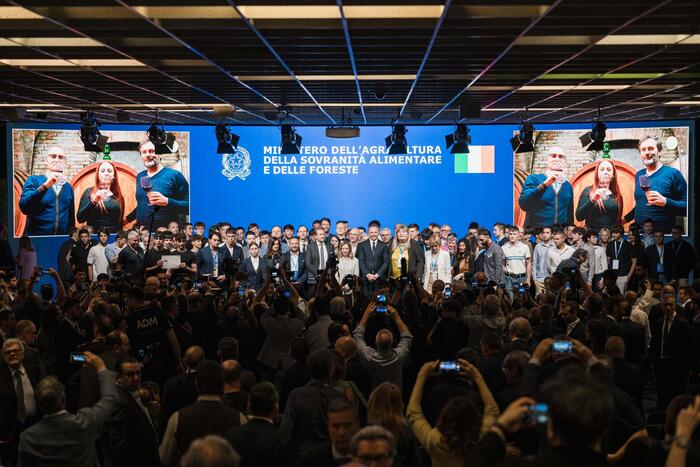Guillaume Klossa is the author of the European Commission report “
Towards European Media Sovereignty, an industrial strategy to leverage data, algorithms and artificial intelligence
” and of the essay “
Media for Good
” (preface Roberto Saviano, Éditions Débats Publics).
Former special advisor to the Vice-President of the European Commission in charge of digital technology, he headed the European Broadcasting Union and was a professor at Sciences-Po Paris.
Europe has come to realize that it is a democratic colossus with feet of clay, but perhaps we are witnessing a strategic awakening.
Europeans finally realize that the first pillar of the sovereignty and autonomy of the European Union is to have a quality information system, pluralist and protected from the filters of platforms and the work of undermining the powers. foreigners.
It is a revolution without fanfare, the importance of which should not be underestimated for the future of the European project.
Read also:
Europe's plan to impose its rules on Gafa
In line with the recommendations of the report “
Towards European media sovereignty
”, the European Commission is presenting on 2 December for the first time in its history a comprehensive strategy to support and transform the European media sector in order to make it resilient.
This strategy includes in particular an industrial action plan for the media and the audiovisual sector led by Commissioner Breton and an action plan for democracy led by Vice-President Jourová.
This includes a section dedicated to information education and the fight against disinformation aimed at ensuring that citizens, and especially the youngest who obtain information mainly via social networks, realize the role key to quality, independent and diversified media for democracy, fundamental rights, the rule of law, understanding of the world, critical thinking but also the cohesion of our societies.
Presented on December 9 by Margrethe Vestager, the Digital Services Act completes this system by proposing a transversal approach to regulate platforms, curb their monopolies, force their transparency, counterbalance their negotiating power and create new rights for citizens.
The realization that without free, pluralist and economically viable European media, no democratic sovereignty or strategic autonomy is possible is recent
The realization that without free, pluralist and economically viable European media, democratic sovereignty and strategic autonomy are not possible is recent.
In his speech at the Sorbonne on European sovereignty in September 2017, President Macron does not make it a priority.
It was President Juncker who, during a public debate in Brussels on May 9, 2017, was the first to commit to urgent action to support the media and press freedom in Europe.
It was during his mandate that a high-level group against disinformation was created and a special advisor for an industrial strategy for the media sector and cultural industries was appointed.
It is the European Commissioner Thierry Breton who takes the bull by the horns by announcing in full pandemic in March, the creation of a sustainable and continental industrial ecosystem for the media and the audio-visual one.
Long neglected by the Commission, the media are finally becoming a strategic priority for the Union.
To read also:
"Freed from Leviathan, France will once again become the place of all innovations"
The challenge of the action plan that it presents is vital: to give the European media the means to survive and to reinvent themselves by making new financial resources available to them, placing them at the heart of future R&D and investment policies. European innovation, by facilitating cooperation to create data spaces dedicated to the media and develop alternative content aggregation platforms to GAFA (Google, Amazon, Facebook, Apple).
It is also a question of supporting innovations, massively promoting new skills and bringing together the sector.
With the unfailing commitment of the President of the European Commission Ursula Von der Leyen, Thierry Breton courageously breaks a major taboo: until then, support for the media was the preserve of the Member States.
How to explain this rupture?
Three factors converge to make this primarily national issue a European issue: digital transformation, the unique societal importance of the sector and the democratic quagmire created by the platforms.
These systemic and structuring platforms that are the GAFA behave like colonial companies, placing most of the European media in a situation of dependence.
The digital transformation is changing the situation through the ubiquity of content now available beyond physical and linguistic borders and the weakening of the economic models of the sector undermined by unfair competition from platforms.
The second reason is the awareness that our post-war liberal European societies are based on two pillars, an informed democracy allowing contradictory and rational debates and a social market economy.
In order to function effectively, these two pillars need quality pluralist information, which is not a market good like any other and is in no way guaranteed by social networks or by platforms filtering information according to algorithms. whose objectives only they know.
To read also:
"Artificial intelligence: a good servant and a bad master"
“
Towards European Media Sovereignty, an industrial strategy to leverage data, algorithms and artificial intelligence
” pointed out the obvious: these systemic and structuring platforms that are the GAFA behave like colonial companies, placing most of the European media in a situation of dependence, by capturing their content, their financial resources, their audiences, their data and their talents without, however, contributing fiscally to European companies or to living together.
The creation of neighboring rights is progress that does not change this state of affairs.
The last element is the danger of the democratic quagmire created by these platforms.
Scandals are accelerating and accumulating (Cambridge Analytica, various leaks of documents and investigations highlighting the personal data available to the platforms), foreign interference in the elections and fake news, so many tiles stuck in the side of our democracies.
So that these proposals do not remain a dead letter, European media, citizens and regulators must immediately mobilize and organize themselves.
Now, the urgency is that this overall strategy be implemented in the coming months.
This supposes that the States integrate as of now the means indicated in the priorities of their recovery plans, largely financed by the European recovery plan of 750 billion euros, and translate into national rights the new European rules on audiovisual media services. , which strengthen the protection of citizens and cultural diversity (only 4 countries out of 27 are currently in order).
The European Parliament and States must also quickly agree on the
Digital Services Act
.
More fundamentally, so that these proposals do not remain a dead letter, European media, citizens and regulators must immediately mobilize and organize themselves.
Read also:
The French army secures a tech nugget coveted by the CIA
What the European Commission is proposing is a real revolution that disturbs many conservatisms and yet serves the interests of democracy, citizens and the media of the Union and gives a first consistency to the notion of European digital sovereignty. .
But let's be realistic, there will be no revolution without collective mobilization!









